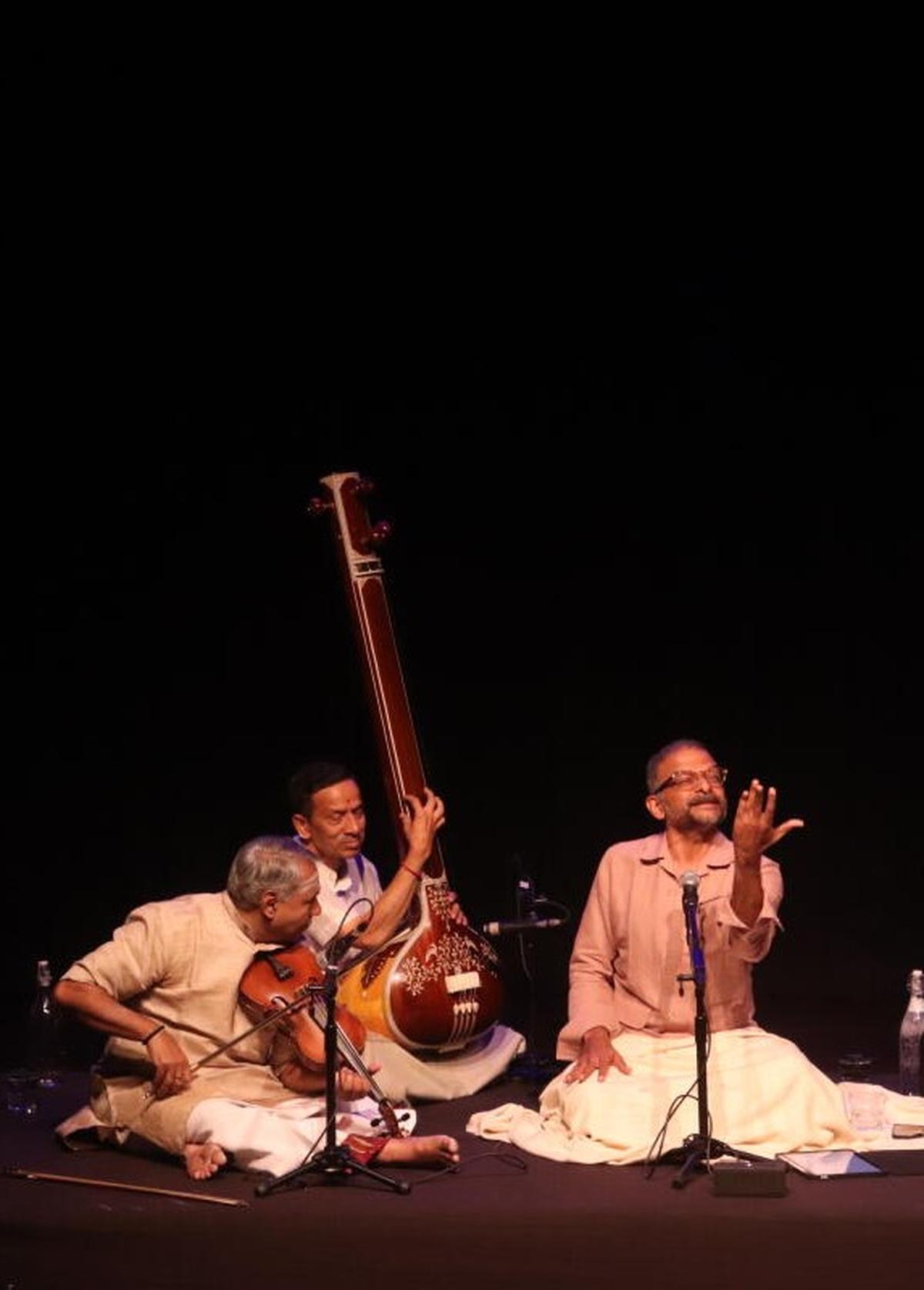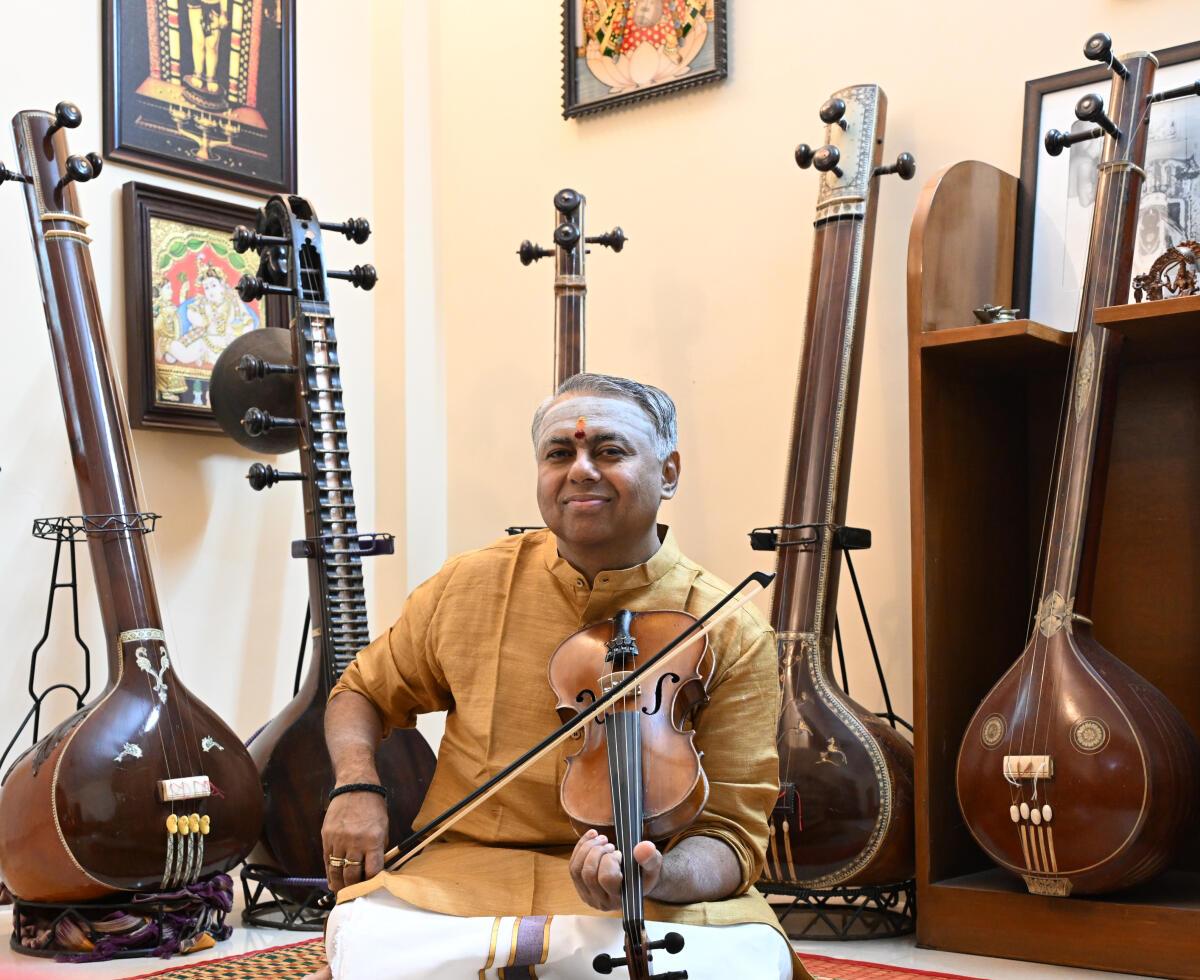The musical bridge called R.K. Shriramkumar

Sangita Kalanidhi designate R.K. Shriramkumar.
| Photo Credit: B. Jothi Ramalingam
R.K. Shriramkumar and I have known each other for nearly 40 years and, obviously, I have many stories to tell. But I am not going to share them with you. I am not going to describe his musical lineage nor explain his journey. Shriram symbolises an idea of Carnatic music that, in today’s world of immediacy and instant gratification, reminds us that gravitas is difficult to achieve. In this essay, I will discuss three ideas around his musical persona.
Shriram’s music is often spoken of as being reminiscent of a bygone era, of belonging to musicians of an older generation. For many, listening to him is nostalgic. This impression is not unexpected considering Shriram’s own demeanour and the fact that he had close associations with many musicians of the past. But, a closer analysis will reveal that his music is not old in that sense. It belongs in the present and, most crucially, is his own. What you hear is Shriram’s own interpretation of raga music that comes from his understanding of its various threads. Sometimes, his ideas are not in concurrence with the musicians of the past. But, something has definitely been lost in Carnatic music and Shriram reminds us of this loss. The loss is not the disappearance of a style nor of a way of thinking. It is the ability of musicians to be themselves yet hold close to their heart the abstractness of the raga experience. Shriram does this with ease, and hence challenges the present norm. Consequently, he is either celebrated as an emblem of the past or categorised as not being one with the times. Both these positions overlook Shriram’s ability to distil and retain from the past only what was quintessential while always being himself. Shriram is not a radical, but neither is he a conformist.

R.K. Shriramkumar accompanying T.M. Krishna at a recent concert held in Bengaluru.
| Photo Credit:
Special Arrangement
Scholarship in music is defined in two ways. There are musicians who are considered scholarly because they tick all the technical boxes. Then there are musicologists, who know the inner workings of music. The emotional landscape of a musical form rarely finds place and is often considered unnecessary in an academic discussion. This view is flawed. The primary reason for a musical form to come into being with all its complexities is evocation. Stripping this away erases its human intentionality. When I speak of the emotionality in music, I am not talking about preference, affinity or taste. Rather, I am referring to the experience of music itself. Every phrase in an alapana, kirtana or niraval needs to have ‘life’ and the musician invests their emotional being into every moment of its creation. There is something intensely selfless about this act. This is the mirror that Shriram shows us all.
His music is all about the heart, yet grounded in a deep understanding of Carnatic music. Here is a serious scholar who is lost in music, but not bound by correctness. While playing a raga, Shriram knows exactly where he is within its grammatical and historical features, but these factors do not dictate what or how he plays. It is the raga’s being that he seeks to share with all of us. If this means there will be musical manoeuvres, deviations and extensions beyond what is acceptable, he will let it happen. The greatness of his mind lies in intuitively having an exact measure of these liberties. What he seems to have internalised is the sonic palate of every raga. Hence none of his emotional outpourings will ever cross that invisible raga limit beyond which the raga is either lost or reduced to just a set of swaras. Shriram will also never allow freewill to tip over and become self-indulgence.

Veteran violinist R.K. Shriramkumar is known for his deep scholarship and adherence to traditional values in music.
| Photo Credit:
B. Jothi Ramalingam
Shriram has, in an unexpected way, also questioned our obsession with technical virtuosity. Virtuosity has always been closely tied with speed and dexterity. No one will ever ask a supremely nimble instrumentalist — even if his mastery over the instrument destroys the basic tenets of the music — whether all that was worth it. Instead, the musician will be lauded. Shriram’s priority has never been this kind of an ability. Instead, it lies in presenting Carnatic music in the manner where raga music is the focus, not the instrument or the individual. Fingering and bowing techniques are meant only to achieve that end. The subtlety involved in sharing phraseologically raga-rich music is not eye catching or applause generating. But it requires a very high level of musical maturity, restraint, and technique. Bhava does not fall from the sky; it lies in technique that is not about fast or accurate movement of the fingers but in acute listening and knowing those in-between positions on the finger board from which an emotional coefficient that is difficult to describe in words blossoms. Shriram uses technique to share a raga’s deepest secrets.
For all his soft and malleable persona, musically, Shriram has absolute clarity of thought, and that comes through in his music. If there was one thing I would ask him to think about, that would be his negation of Shriram the individual. In his need to ensure that the great musicians of the past who have taught and influenced him are acknowledged, he often ignores himself. Every generation needs an individual who stands on their own. If not, in the desperation to belong to a continuum, creativity will die and music itself will become fossilised in an imaginary past. R.K. Shriramkumar is a stalwart of his generation who remains steadfast in his musical beliefs and continues to swim against the tide. This is admirable and rare. Such an individual needs to be celebrated for who he is.
Published – November 27, 2025 11:33 pm IST